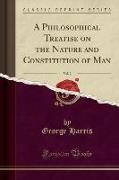Read more
Excerpt from A Philosophical Treatise on the Nature and Constitution of Man, Vol. 2
It may, however, be said that if men are not free to choose, being compelled to select that course which appears the chief good; it must be unjust to in¿ict punishment for not acting in a particular course, when men are not free to act. To this I reply that the very introduction of the punishment alters the balance of motive, and leads the individual to act in conformity with the law; which he does, nevertheless, quite voluntarily and from choice, as he still follows the course which will ensure him the greatest good, and preserve him from ill.' The frustration of the will, when the individual is compelled by circumstances to pursue a course of conduct different to that dictated by his will, as when he is under restraint; occasions direct violence to his feelings and emotions, and produces a vehement perturbation in the soul.6 Where a course of conduct is pursued different to that which the general result of the con current medial and mental in¿uences would have directed, On account of some special evil threatening us in case we do not follow the former course; it is still the will by which we are determined, although in such case the will itself is not free, but is constrained. Nevertheless, even here, the will is the result of the reciprocal in¿uences by which we are affected.
About the Publisher
Forgotten Books publishes hundreds of thousands of rare and classic books. Find more at www.forgottenbooks.com
This book is a reproduction of an important historical work. Forgotten Books uses state-of-the-art technology to digitally reconstruct the work, preserving the original format whilst repairing imperfections present in the aged copy. In rare cases, an imperfection in the original, such as a blemish or missing page, may be replicated in our edition. We do, however, repair the vast majority of imperfections successfully; any imperfections that remain are intentionally left to preserve the state of such historical works.

